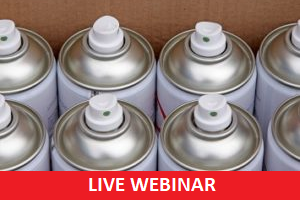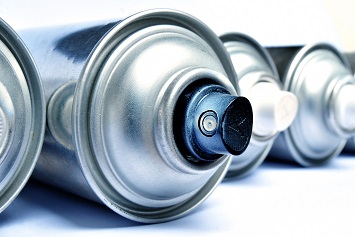In March, the U.S. Environmental Protection Agency (EPA) issued a proposed rule that would reclassify used aerosol cans from a hazardous waste to a universal waste.
Currently, most waste aerosol cans that are not empty are regulated as hazardous waste because they exhibit a hazardous characteristic, such as ignitability, or because they contain an RCRA-listed chemical substance. Used aerosol cans are also currently subject to strict cradle-to-grave regulatory requirements, which include:
- Limits to on-site accumulation times and volumes,
- Manifest requirements, and
- Land disposal restrictions.
Universal Waste Aerosol Can Rule: What It Means for Your Disposal Program
Under the revised rule, aerosol cans would be subject to fewer labeling requirements, could be stored on-site in greater quantities for up to 1 year, and would not count toward a company’s hazardous waste generator status. While this would mean that discarded aerosol cans could be consolidated at central locations and transported without a hazardous waste manifest, Department of Transportation (DOT), Occupational Health and Safety Administration (OSHA), and local fire code requirements would still apply. It is important to note that compressed gas containers and propane cylinders would be excluded in the regulatory definition.
Leveraging Technology to Manage Waste
Managing hazardous and universal waste can be labor intensive. State/provincial and federal regulations can be confusing at times, and operations may not fully understand the risks that these products pose to human health or the environment if they are mismanaged. Today, technology can help environment, health, and safety (EHS) teams streamline and standardize waste management processes throughout their organizations and eliminate paper forms. This helps to reduce noncompliance risks, improve visibility of the wastes stored on-site, and eliminate double entry of data.
Technology can also be useful for health and safety professionals who are managing medical surveillance to identify and manage similar exposure groups, as well as providing employees with centralized access to safety data sheets (SDSs) and proper personal protective equipment (PPE) training. Managing EHS programs with pen-and-paper or filing cabinet systems are fading quickly as more and more companies move to 21st century technology to collect data, manage compliance, identify risks, and take proactive measures to reduce these risks.

Summing Up
The EPA expects the new aerosols rule, if finalized, to ease the regulatory burden for companies, especially retailers. The EPA estimates that up to 40% of hazardous waste from retailers comes from aerosol cans, and it also noted that there are four states—California, Colorado, Utah, and New Mexico—that already regulate aerosol cans as universal waste. Two other states, Ohio and Minnesota, have proposed reclassifying aerosol cans to universal waste under state regulations.
Reclassification could also eliminate the need for certain companies to participate in the e-manifest program, which would further reduce costs and save time. According to the EPA, this change would encourage recycling and save at least $3 million per year in regulatory costs. The EPA accepted comments on the proposed rule through May 15, 2018.
Learn More
To learn more about hazardous waste disposal, join me on June 26 for a live webinar, Hazardous Waste Disposal: How the Proposed EPA Rule Will Simplify the Management of Used Aerosol Cans, when I will discuss the current regulatory landscape, what the proposed rules could mean for industry, and how technology can assist companies managing their hazardous and universal waste to better ensure compliance.
 Ian Cohen, MS, is the Product Marketing Manager responsible for Cority’s environmental and safety solutions. Before taking this role, Cohen was Cority’s Environmental Product Manager, where he was responsible for developing Cority’s environmental compliance and data management solutions. Ian Cohen, MS, is the Product Marketing Manager responsible for Cority’s environmental and safety solutions. Before taking this role, Cohen was Cority’s Environmental Product Manager, where he was responsible for developing Cority’s environmental compliance and data management solutions.
Before joining Cority, Cohen was an environmental specialist at Florida Power & Light Company, a NextEra Energy, Inc., company, where he led the development, implementation, and management of various environmental management systems and programs. He is well versed in the development of enterprise environmental management information systems and is a subject matter expert in corporate sustainability, including program development, annual reporting, and stakeholder communications. He has earned a Bachelor of Science degree in Biology and a Master of Science in Environmental Science, both from The University of Tennessee at Chattanooga. |

